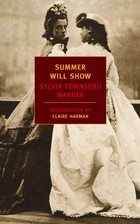 I’m reading Sylvia Townsend Warner’s Summer Will Show right now. It’s about an Englishwoman who runs away to Paris and falls in love with her husband’s mistress. I’d been wanting to read it ever since Sarah Waters named it as one of her favorite novels. At the time, it was out of print. But NYRB Classics reissued the novel this August, and I really think you couldn’t do better than to get yourself a copy.
I’m reading Sylvia Townsend Warner’s Summer Will Show right now. It’s about an Englishwoman who runs away to Paris and falls in love with her husband’s mistress. I’d been wanting to read it ever since Sarah Waters named it as one of her favorite novels. At the time, it was out of print. But NYRB Classics reissued the novel this August, and I really think you couldn’t do better than to get yourself a copy.
Warner was a poet as well as a novelist, and as I read I find myself admiring how this shows in how she works her sentences. It sounds like a deadly dull thing to praise, a writer’s sentences, maybe because its praise that often gets awarded to books that are stultifying (meditations on a woodpile and changing cloud patterns and something-something about mortality and oh my god what page am I on it is only page 23). But the fact is Warner’s sentences are unusually beautiful, and I keep wondering what it is about them that makes them so.
One particular thing I’ve noticed is the ratio of Latinate to Anglo-Saxon in the paragraphs. Warner’s a very elegant stylist, and one danger of “elegant prose” is how easily it can become overly smooth and glassy. And then the reader slips right off the face of it. One of Warner’s tricks is to pop in an Anglo-Saxon-rooted word here and there that’s not only a good, just-right word, it also works like a prick to keep the paragraph from growing too smooth.
Example of elegance that would become glassy if the entire novel were like this:
Together they would look out of the window at the unfinished Ste. Clotilde, and an artistic conversation would take place, Père Hyacinthe with roulades of language expatiating on the beauties of the Gothic Frederick supplying cadences of agreement, till the two voices joined, as it were, in a duet, aspiring in thirds and sixths …
Example of a prick in the elegance:
The pleasures of avarice were emphasized by the surroundings. It was difficult to believe that this was Paris, so nipped and dingy did it look, so down-hearted and down-at-heel. A shrewish wind was blowing.
The “shrewish” is good, but the “nipped” is perfect.
Another prick:
The smell of the sea, melancholy like a whine, rose from the filthy clucking water.
The inverse, of course, is also true. Sometimes the elegance extends and makes beautiful what would otherwise be ordinary. Here is a sentence that could have been “and they breakfasted on coffee, bread and sausage”:
Some tin coffeepots, long wands of golden bread, a sausage in a paper chemise, gave a domesticated appearance to the barricade.


 On Monday I appeared on Soundcheck, WNYC’s daily talk show about music, to talk about my Wall Street Journal
On Monday I appeared on Soundcheck, WNYC’s daily talk show about music, to talk about my Wall Street Journal  • What I’m listening to: Rosanne Cash’s
• What I’m listening to: Rosanne Cash’s